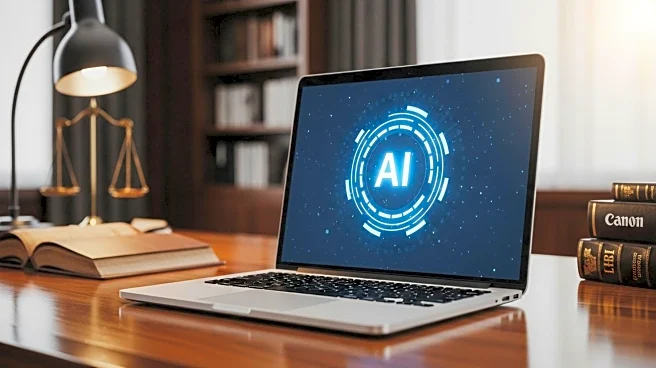What's Happening?
Mississippi College School of Law has announced a new mandatory AI certification program for its first-year students, joining Case Western Reserve University School of Law in this initiative. The program, developed in partnership with Wickard.ai, aims to prepare students for the integration of artificial intelligence in legal practice. It includes foundational instruction, hands-on training with AI-powered legal tools, and an assessment to ensure competency. The curriculum covers ethical and regulatory aspects of AI, with sessions on AI models, ethical use in research and client service, and federal and state AI regulations. The course concludes with a certification exam, granting students an AI legal practice certification upon passing.
Why It's Important?
The introduction of mandatory AI certification in law schools reflects the growing importance of AI in the legal industry. As AI technologies become integral to legal research, drafting, and client services, law schools are adapting their curricula to ensure future lawyers are equipped to use these tools effectively and ethically. This move is significant for the legal profession, as it addresses the need for attorneys to understand AI's capabilities and limitations, reducing the risk of errors such as caselaw hallucinations. By preparing students for AI integration, law schools are fostering a new generation of lawyers who can leverage technology to enhance legal services and improve client outcomes.
What's Next?
As more law schools adopt AI certification programs, the legal education landscape is likely to shift towards incorporating technology training as a standard component. This trend may prompt other institutions to develop similar programs, potentially leading to widespread changes in how law is taught. Stakeholders such as legal educators, technology companies, and regulatory bodies may collaborate to establish best practices and standards for AI use in legal contexts. Additionally, the legal industry may see increased demand for professionals skilled in AI, influencing hiring practices and career development opportunities.
Beyond the Headlines
The integration of AI into legal education raises ethical and cultural considerations. As AI becomes more prevalent, questions about data privacy, algorithmic bias, and the role of human judgment in legal decision-making will become more pressing. Law schools must address these issues to ensure that future lawyers are not only technically proficient but also ethically aware. This development may also influence public perception of the legal profession, as the use of AI could be seen as a way to enhance transparency and efficiency in legal processes.









